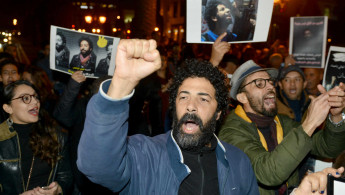Moroccans protest in solidarity with journalist arrested over tweet
Omar Radi was arrested on Thursday in Casablanca and immediately put on trial for the tweet about a judge prosecuting protest leaders, his lawyer said.
If found guilty of insulting a magistrate, the 33-year-old journalist could face up to one year in jail. The next hearing is set for January 2, according to Radi's lawyer Said Benhammani.
In the Moroccan capital Rabat, crowds of supporters gathered outside parliament on Saturday and chanted "Free Omar", accusing the government of "corruption" and claiming judges were "at the order" of authorities.
Radi's case has sparked outrage from local and international human rights groups who say the journalist's arrest is part of an uptick in attacks on human rights and individual freedoms in Morocco.
"Radi's unjustified detention and trial comes amidst an increasingly suffocating atmosphere for Moroccan journalists, dissidents, and artists who speak out on social media," Human Rights Watch's Sarah Leah Whitson said.
Twitter Post
|
"If you express your dissatisfaction of the government on YouTube, Facebook, or Twitter, you risk jail in Morocco. Not great for a country that still postures as a 'liberal exception' in the Arab world."
Whitson said Radi, an award-winning journalist and human rights activist, should be released, adding that the case against him "reeks of political vengeance" against his work.
In April Radi criticised judge Lahcen Tolfi after he upheld sentences of up to 20 years in jail against leaders of the Hirak protest movement that rocked the country in 2016 and 2017.
He called him a "henchman" who "carried out orders" from higher up.
On Thursday YouTuber Mohamed Sekkaki, known as "Moul Kaskita", was sentenced by a court in the western city of Settat to four years in prison for "insulting the king".
Sekkaki, whose videos usually exceed 100,000 views, was arrested in early December after posting a video in which he insulted Moroccans as "donkeys" and criticised King Mohammed VI, who is considered "inviolable" under the constitution.
Earlier this month a high school student was given a three-year jail sentence for sharing on Facebook a contentious song denouncing injustice and money-grabbing in Morocco.
The song "Aach al Chaab" - which means 'long live the people' - was co-written by popular Moroccan rapper Mohamed Mounir, known as Gnawi, who was sentenced to one year in jail in November over the song.
The song's lyrics also attacked the king directly, but Gnawi escaped a jail sentence for the offence. The rapper was sentenced on the lesser charge of insulting the police.
The group Reporters Without Borders in its latest annual press freedom index ranked Morocco 135th out of 180 countries.
Follow us on Twitter and Instagram to stay connected





 Follow the Middle East's top stories in English at The New Arab on Google News
Follow the Middle East's top stories in English at The New Arab on Google News

![MP Essam Diab's pursuit to block TikTok in Egypt has revived an already ongoing debate in the country. [Getty]](/sites/default/files/styles/image_330x185/public/1230748046.jpeg?h=a5f2f23a&itok=-8MqBLLC)
